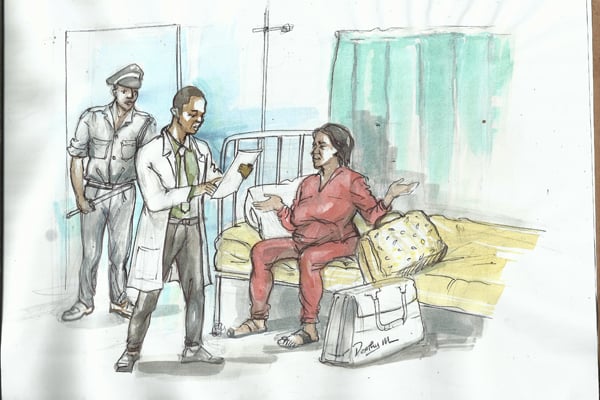Court rules on detention of a patient

What you need to know:
- Court considered the fact that the patient was officially discharged from the hospital.
Emmah Muthoni Njeri was admitted at the Nairobi Women’s Hospital on March 23, 2018 and discharged on May 14, 2018 with an accumulated hospital bill of about KShs3m (Shs100m).
She was able to pay about one third of the bill and made proposals on how to pay the outstanding balance.
Detained
The hospital, however, rejected her proposal but instead detained and incarcerated her at the hospital premises and continued to levy charges on her. She was finally released by the hospital on October19, 2018 and by then her bill had risen to more than KShs4m.
Sues hospital
On October 15, 2018, lawyers representing Ms Njeri sued the hospital for unlawfully and illegally detaining her and levying on her unreasonable and unjustified charges. The case was instituted at the Constitutional and Human Rights Division of the High Court of the Republic of Kenya and key to the suit was the violation and abuse of her constitutional rights and fundamental freedoms and infringement of her freedom of movement by this action of the hospital.
The law
The law clearly states that no one shall be imprisoned merely on the ground of inability to fulfil a contractual obligation.
The lawyers asked court to award the patient KShs10m as general damages and KShs5m as exemplary damages for unlawful detention and false imprisonment and pleaded to court to consider the duration and circumstances of her detention when compensating her.
Defense
The hospital, in response, told court that the patient was not detained but was justifiably kept in the hospital for fear that she would fail to pay the bill incurred. The patient signed an undertaking at the time of her admission that she would pay for medical services rendered to her once furnished with a medical bill. In the course of the treatment the patient was updated on the status of the medical bill and she continued to assure the hospital that the bill would be settled in full. The patient was released from the hospital after she had agreed, in writing, to pay KShs10,000 per month until the entire debt was paid in full.
The hospital was of a strong view that the patient had come to court with unclean hands as she had not paid her hospital bill in full. The hospital’s lawyers submitted to court that since the patient had not paid her bills the award of damages to her would amount to unjust enrichment and she, therefore, was not entitled to any damages.
The lawyers, therefore, raised a cross-petition to recover the balance of the medical bill that the patient had not cleared and requested that this be deducted from any costs that the court may award to the patient.
Lawyers oppose cross-petition
Lawyers acting for the patient, however, opposed this cross-petition on the grounds that it did not raise any constitutional issues and was there brought before the wrong court and in bad faith in a clear abuse of the court process. The counter argument was that under the Constitution the enjoyment of rights and freedoms by an individual should not prejudice the rights and freedom of others. It was, therefore, submitted that in this matter under the Constitution the hospital has property rights including the right to have its bills paid.
Ruling
Court considered the fact that the patient was officially discharged from the hospital, and in writing, on May 14, 2018. To Court the patient was, therefore, arbitrarily detained until October 19, 2018; that is, the patient was held within the hospital premises for over five months after her official discharge. The courts of law are clear on this; any form of detention not sanctioned by the law that seeks to procure performance of contractual debt is a violation of the right to liberty. It is an affront to human dignity to detain someone of a debt that cannot be enforced against them. Court, therefore, ruled that the hospital was not empowered under the law to hold any person within the hospital for failure to pay medical bills.
To court the hospital’s action of holding the patient over unpaid medical bills makes it culpable for illegally detaining the patient. Much as the patient was in breach of her contractual obligation to pay her bill, the hospital had other options open to it to recover the debt and should not have detained the patient. Court, therefore, agreed with the patient that the hospital unlawfully detained her for six months for failure to meet her medical expenses. The court cited various judgments in which detention of patients by hospitals over unpaid bills was outlawed. In one case a judge ruled “What emerges from the decision I have cited above is the centrality of the liberty of the person and the protection from illegal and false imprisonment as one of the fundamental rights and freedoms enshrined in our Bill of Rights.
In yet another case court stated “From my analysis, I cannot say the patient’s rights were violated until after May 14, 2015. The patient was held against her will for about seven days until May 22, 2015. The hospital could have released her and recovered the debt in the manner provided by the law. But it chose the easier and perilous route of detaining the patient. This was a violation of her constitutional rights enshrined in the Constitution.
To be continued




